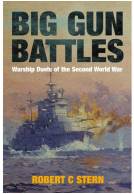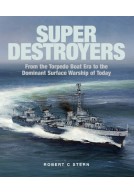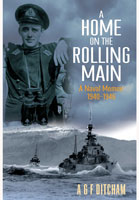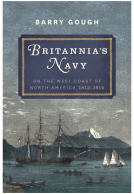The Modern Cruiser (Hardback)
The Evolution of the Ships that Fought the Second World War
(click here for international delivery rates)
Need a currency converter? Check XE.com for live rates
| Other formats available | Price |
|---|---|
| The Modern Cruiser ePub (29.0 MB) Add to Basket | £16.99 |
Cruisers probably vary more in their characteristics than any other warship type and have certainly been subject to the most convoluted development. There was always a basic tension between quantity and quality, between numbers and unit size, but at a more detailed level every one of the naval powers made different demands of their cruiser designers. This makes the story of cruiser evolution in the world’s major navies fascinating but complex.
This book sets out to provide a coherent history of the fortunes of this ship-type in the twentieth century, beginning with a brief summary of development before the First World War and an account of a few notable cruiser actions during that conflict that helped define what cruisers would look like in the post-war world. The core of the book is devoted to the impact of the naval disarmament treaty process, which concentrated to a great extent on attempting to define limits to the numbers and size of cruisers that could be built, in the process creating the ‘treaty cruiser’ as a type that had never existed before and that existed solely because of the treaty process.
How the cruisers of the treaty era performed in the Second world War forms the final focus of the book, which concludes with a look at the fate of the cruiser-type since 1945. The result is probably the best single-volume account of the subject to date.
Overall, the book was satisfactory and presented new information about these ships that was both informative and fascinating. Recommended!
Nautical Research Guild - Nautical Research Journal, Winter 2020, Vol.65, No.4
I found it a really interesting read and personally learnt a lot.
Military Model Scene
Read the Full Review Here
As one would expect from this publisher, the book is produced to a high standard, with a wide range of excellent photographs, as well as source notes. Although in 'coffee table' format, thanks to the author's lively writing style the work succeeds both as a readable operational history and as a reference for researchers. This is an important contribution to the historiography of the Second World War at sea, deserving a wide readership among historians and general readers.
Simon Bellamy, The Naval Review - Summer 2021
The Modern Cruiser is an important and informative book that should be required reading for all those with an interest in 20th century cruiser design.
Warship Annual 2021 Edition
The photographic content has been used to good effect to enhance the text while I found the copious end notes to be interesting and useful. In my opinion, this book is probably the best single volume account of the subject to date and I have no hesitation in recommending it to all cruiser enthusiasts.
World Ship Society - Marine News, December 2020
A curious and interesting book.
Miniaturas JM
Read the full Spanish review here
The prolific author Mr. Robert C. Stern has produced another interesting, well-written, and well-grounded survey of 20th Century warship history in his new book Modern Cruiser.
Warship International from the International Naval Research Association
As featured on Scale Modelling Now
Scale Modelling Now
The Modern Cruiser is a very detailed book covering every aspect of those vessels from drawing board to combat performance. Stern examines individual ships and classes throughout, highlighting improvements but also their problems. The result is a real sense of evolution, befitting the book’s subtitle. Stern’s discussion of the politics of Cruiser building is well-balanced and informative, particularly the chapters on between-the-wars initiatives. A superb collection of photographs illustrates Stern’s thoroughly researched and well-written book. Anyone interested in 20th Century warships will enjoy this book.
Beating Tsundoku
Read the full review here
As featured by
International Plastic Modellers Society
Another well-crafted book from a leading author in his field. An entertaining and informative review of the evolution of one of the most important classes of warship, from the technology of WWII, into the missile age – Most Highly Recommended
Firetrench
Read the full review here
The book proceeds in chronological order in 12 chapters, there are abundant first class photographs and some helpful technical drawings to illustrate points in the text. The work covers most of the large and medium navies of the world and looks at how the different design trends developed and evolved.
Army Rumour Service (ARRSE)
The book runs to 259 pages with an excellent set of notes, list of sources and a good index. The obvious omission is HMS Belfast, ironically one of the few surviving cruisers. Printing is to a high standard by Seaforth Publishing. The book is aimed at the serious naval reader and would make a handy tool for further research. Technical gunnery types will also find plenty to keep them interested. For landlubbers there is a convenient list of abbreviations and acronyms on page 8-9.
Read the full review here
Having undergone a convoluted development, cruisers vary more in their characteristics than any other warship type. I have to confess that in my time I would have liked to serve in a cruiser – halfway between the snug living of a destroyer and the huge complexity of a capital ship. Stern chronicles the fortunes of this ship-type in the twentieth century, beginning with a brief summary of development before the First World War and an account of a few notable cruiser actions during that conflict that helped define what cruisers would look like in the post-war world. The core of the book is devoted to the impact of the naval disarmament treaty process, which concentrated on attempting to define limits to the numbers and size of cruisers that could be built. How the cruisers of the treaty era performed in the Second world War forms the final focus of the book, which concludes with a look at the fate of the cruiser-type since 1945. This single-volume account of the complex development of the cruiser gives me a fine insight into the breed and makes for a comprehensive reference for all students of naval warfare.
Julian Stockwin
Read the full review here
This is an excellent work, well structured and painting a good picture of how the naval treaties impacted on cruiser design, and on how the desires of each naval power impacted on the naval treaties.
History of War
Read the full review here
I think that we need to say from the start that this is a very comprehensive and detailed book about the modern day cruiser, and it contains magnificent detail, information and reference. The book is obviously spilt into a number of chapters such as looking at the birth of cruisers, getting through WWI, and from then on the various chapters look at the cruiser through the various years of development in like 5 – 10 year chunks. This book looks at cruisers from all around the world but it goes into depth about various ships in design, dimension, build, calibre and military firepower.
UK Historian
Now I should admit I am no expert on Naval Warfare or the vessels that command the oceans, but I feel after reading through that I have learnt an awful lot, not just about dimensions and types of ship needed but especially in this book a lot about the laws and rules of building a fleet. This book most certainly reads and feels like a definitive and important book, written by an author Robert C. Stern who is clearly an expert and knowledgeable person having written about this subject for nearly 30 years. So credit goes to the author for is clear and comprehensive writing and Seaforth Publishing for bringing us a brilliant book. I should also comment that the pictures, photographs and diagrams within this book are fantastic and certainly do complete the book. So from someone who most certainly an expert on this subject, I would happily give it a 5 star rating.
Read the full review here
About Robert C Stern
Robert C. Stern has been writing naval history for more than thirty years, during which time he has published four major works and numerous monographs for the history buff and modeler.
His major works include Type VII U-boats and The Lexington Class Carriers, both of which were technical analyses of important warship types, and Battle Beneath the Waves: The U-boat War, which was a collection of stories of of U-boat warfare from the two World Wars.
His most recent work is Destroyer Battles - Epics of Naval Close Combat accounts dramatic engagements in the history of destroyer warfare.
His other main interest is photography, which can be seen at www.stern-photography.com. He lives in Cupertino, CA, with his wife Beth and two uninterested cats.





















